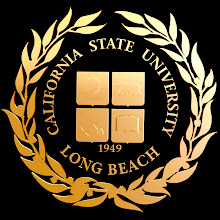Cal State Long Beach (CSULB) Communicative Disorders Chair Carolyn Conway Madding was named a Diversity Champion recently by the American Speech-Language-Hearing Association (ASHA) in a ceremony held in New Orleans.
Madding was recognized for her initiation, development and supervision of CSULB’s Linguistically Different Clinic, which incorporates instruction in bilingual assessment and management and for restructuring the Communicative Disorders Department curriculum to include instruction in serving clients from diverse linguistic and cultural backgrounds.
“During the 20 years I have been here, we have treated clients in 26 different languages with disorders that cover the spectrum, including aphasia, traumatic brain injuries, autism and stuttering,” pointed out Madding, who has brought in nearly $2 million in grant money for the education of bilingual speech-language pathologists. “These linguistically different services are so rare in this area that people will come from 40 to 50 miles away to avail themselves of these services.”
Madding, who joined CSULB in 1989, said she was near tears when she received the award’s medallion and a standing ovation from her peers. “It was a very special honor to get this award,” she said. “It was the highlight of my career.”
Madding believes her initiation of the linguistically different clinic was a big reason for her distinction. “There is no other clinic like this,” she explained. “Some schools allow a student to work with one or two clients in the student and client’s non-English language. All of our graduate students must obtain clinical hours in the Linguistically Different Clinic. Even if they speak only English, they go through the clinic and work with an interpreter to serve people in another language. That is unique in this profession.”
Madding said when she came to CSULB, she came to work on the diversity track. For her, getting the Diversity Champion award from ASHA was icing on the cake after having spent 21 years working in the area of diversity.
"Our linguistically different clinic has been in operation for 21 years to provide services for anybody with any communicative disorder whose first language is not English. We also do special evaluations for the Stephen Benson Program to determine if students being evaluated for a learning disability may have a language-based problem," she said. "A language disorder can only be determined if the student is evaluated and shows problems in all languages spoken, and is not an English-as-a-second-language problem.”
ASHA is the national professional, scientific, and credentialing association for more than 150,000 audiologists, speech-language pathologists, and speech, language, and hearing scientists. Speech-language pathologists identify, assess, and treat speech and language problems including swallowing disorders. ASHA recognizes Diversity Champions for advancing multicultural issues in communication sciences and disorders.
Madding earned her bachelor’s degree in secondary education from Ohio State, a master’s in communicative disorders from Cal State Fullerton in 1982 and a Ph.D. in anthropology and linguistics from Claremont Graduate University in 1995.
In addition to the clinic, Madding is the co-creator of a new special cohort M.A. program, which is run through the university’s College of Continuing and Professional Education. Started in 2007, the program has doubled the number of graduate students in the Communicative Disorders Department. The first cohort of 30 students graduated last summer, and according to Madding, all 30 students left the program with good-paying jobs. A second cohort of students began last fall.
Her recognition as a Diversity Champion reflects how CSULB has changed in the 20 years since her arrival, Madding feels. “When I received my first grant, I had to scour the campus to find a bilingual student,” she recalled. “Now bilingual students practically beat down my door. We offer a welcome to students of all linguistic groups and ethnicities. Other programs believe students must speak English as a first language in order to be a competent speech-language pathologist. ASHA doesn’t feel that way and neither do we.”
-- Rick Manly
Subscribe to:
Post Comments (Atom)




No comments:
Post a Comment